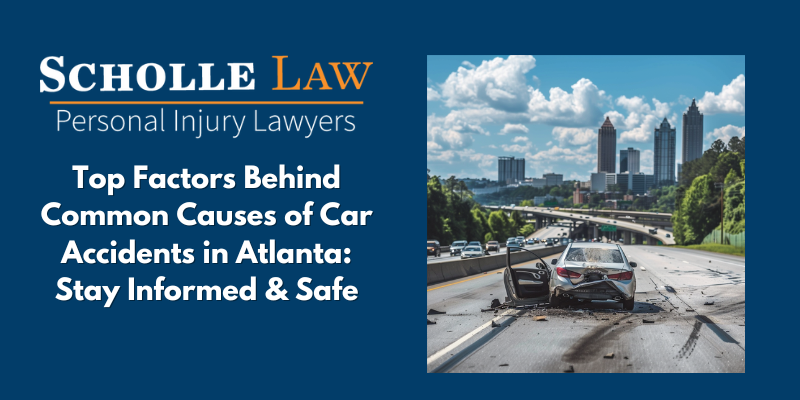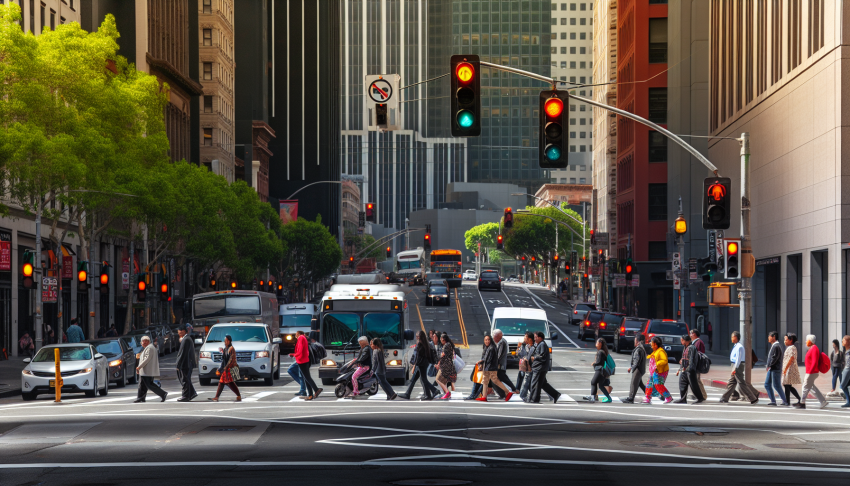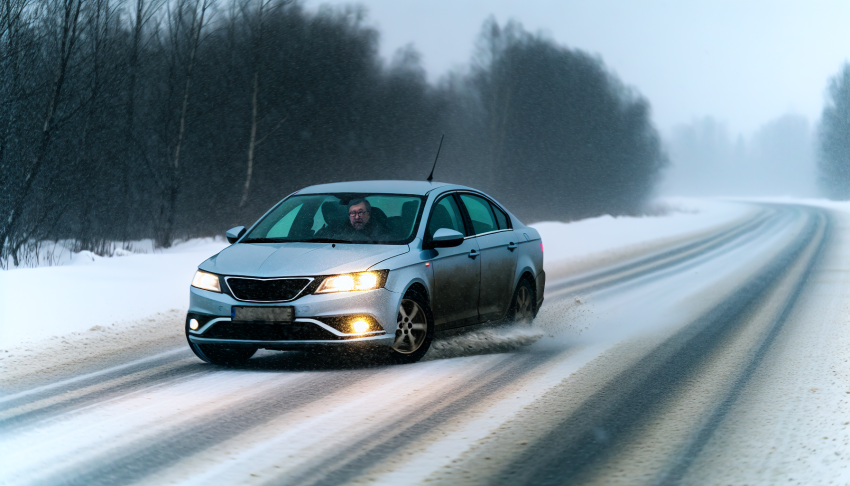4.9 Rating
Google REVIEWS
Leaders in Georgia Personal Injury Law Since 1995
Top Factors Behind Common Causes of Car Accidents in Atlanta: Stay Informed & Safe
At Scholle Law, we think it’s important to understand the common causes of car accidents in Atlanta as it’s crucial for safe navigation through our busy streets. This article offers a straightforward analysis of the main factors, from reckless driving to weather challenges, that lead to collisions in the city. Gain insights without the fluff and learn how to protect yourself on the road.

Key Takeaways
- Distracted driving, especially activities like texting, significantly increases the likelihood of car accidents in Atlanta, contributing to thousands of deaths annually.
- Speeding and aggressive driving in Atlanta amplify the risk of fatal accidents, with speeding alone accounting for roughly one-third of all fatal motor vehicle crashes.
- Poor weather conditions, vehicle defects, and drowsy driving are crucial factors behind car accidents in Atlanta, emphasizing the need for cautious driving and regular vehicle maintenance.

Prevalent Causes of Atlanta Car Accidents
Navigating the hustle and bustle of Atlanta’s roads can be a challenging task, even for the most experienced drivers. A significant number of car accidents in Atlanta occur at or near intersections, often due to running red lights or making unsafe turns. This highlights the importance of vigilance, especially when approaching junctions.
Speeding, a bane of any city’s roads, is implicated in about one-third of fatal accidents in Atlanta. Add to this the behaviors like improper lane change accident, and you have a recipe for disaster. Such aggressive driving behaviors amplify the risk of collisions, making the city’s roads a high-risk zone for drivers, passengers, and pedestrians alike.
Another significant contributor to Atlanta’s high rates of car accidents is heavy traffic, particularly on major streets and interstates. Congested conditions, coupled with distracted driving and drunk driving, create a potent mix of risk factors on the roads. Thus, safe driving practices should be observed, no matter the time, place, or circumstances, in order to mitigate the causes of car accidents.

Distracted Driving: A Major Issue
Distracted driving is not just a prevalent issue in Atlanta; it is the leading cause of car accidents in the United States, resulting in close to 3,000 deaths annually. So, what exactly is distracted driving? It includes inattentive behaviors such as:
- texting
- talking on the phone
- eating or drinking
- talking to people in your vehicle
- adjusting the stereo, entertainment, or navigation system
- using a cell phone or smartphone
- watching a video or playing a video game
- using a navigation system
- reading, including maps
- grooming, such as putting on makeup or shaving
- talking to passengers
- using a hands-free device
These activities can take a driver’s attention away from the road, combining visual, manual, and cognitive distractions, potentially affecting other drivers.
Texting while driving, in particular, is equivalent to driving the length of a football field blind when traveling at 55 mph. It’s no wonder then that in 2021, there were more than one death per day, totaling 410 fatalities, as a direct result of accidents caused by texting and driving.
The issue of distracted driving becomes even more critical when we consider its impact on young drivers. Around 9 percent of young drivers are distracted at the time of a fatal crash, compared to 4-7 percent of older drivers. Insurance companies are combatting this by offering apps that monitor such behavior and incentivize safer driving habits through discounts, complementing laws like bans on texting while driving.
Drunk Driving: Putting Lives at Risk
Drunk driving is a dark cloud hanging over Atlanta’s roads, contributing to approximately one-third of traffic fatalities. In the United States, driving with a blood alcohol concentration (BAC) of .08 grams per deciliter (g/dL) or higher is illegal, except in Utah where the limit is .05 g/dL. But what makes drunk driving such a notable issue?
Alcohol impairs critical abilities for safe driving, such as thinking, reasoning, and muscle coordination, with impairment increasing alongside BAC levels. Even a slight amount of alcohol, with BAC as low as .01 to .07 g/dL, can affect driving capability and was responsible for 2,266 deaths in 2021. The risk of an accident magnifies considerably at higher BAC levels. For example:
- A driver with a BAC of .08 g/dL is about four times more likely to crash than a sober driver.
- A driver with a BAC of .10 g/dL is about seven times more likely to crash than a sober driver.
- A driver with a BAC of .15 g/dL is about 25 times more likely to crash than a sober driver.
It is important to remember that any amount of alcohol can impair your ability to drive safely, potentially turning you into a drunk driver.
The annual financial burden of impaired driving crashes in the U.S. reached a staggering $68.9 billion in 2019. Despite strict enforcement of drunk-driving laws, including financial penalties and mandatory ignition interlock devices, the issue persists. Thus, it falls on each driver to assume responsibility for their actions to promote safer roads for all.

Speeding and Aggressive Driving Behaviors
Speeding is another widespread issue on Atlanta’s roads, contributing to approximately one-third of all fatal motor vehicle crashes. And the risks increase with speed; for every 10 mph increase in speed, the risk of dying in a crash doubles, potentially resulting in 9,378 deaths in 2018. As driving speed increases to 80 mph from 60 mph, the fatality risk quadruples, primarily because higher speeds require longer stopping distances and diminish a driver’s ability to maneuver safely through curves.
Aggressive driving behaviors, including:
- speeding
- tailgating
- improper lane changes
- running red lights
Account for 54% of fatal crashes, car crashes often result in devastating consequences. Head on collisions, in particular, can be extremely dangerous. The effectiveness of safety features like airbags and seat belts is compromised as the force of an impact increases with speeding, reducing their protective benefits during a car crash.
Moreover, speeding puts pedestrians and cyclists in greater danger, contributing significantly to a rise in fatalities among these vulnerable road users.

Poor Weather Conditions and Car Accidents
The weather plays a significant role in the safety of Atlanta’s roads. Bad weather conditions such as:
- rain
- snow
- ice
- fog
significantly increase the likelihood of car accidents. Weather conditions like heavy rain, dense fog, and icy roads can increase risks of vehicle skidding and loss of control, posing a severe threat to Atlanta drivers.
Atlanta deals with challenging winter driving conditions on average 48 days a year when the temperature drops below freezing. The 2014 ice storm in Atlanta, which led to major pile-ups and extended road closures, serves as a stark reminder of the severe impact icy conditions can have on road safety. To decrease accidents amidst poor weather conditions, it’s recommended for Atlanta drivers to modify their driving habits, like slowing down and maintaining a safe distance from other vehicles.

Fatigue and Drowsy Driving
Another significant contributor to car accidents in Atlanta is drowsy driving. Drowsy driving is responsible for roughly 100,000 crashes annually, resulting in about 71,000 injuries, 1,550 fatalities, and estimated costs exceeding $100 billion (if including non-fatal injuries but not property damage). Fatigued driving amplifies accident risk by:
- impairing attention
- delaying reaction times
- diminishing judgment
- causing poor speed and distance estimation.
Drowsy driving accidents frequently occur between midnight and 6 a.m. or in the late afternoon, coinciding with the body’s circadian lows. Signs of sleepiness include yawning, heavy eyelids, and missing exits, which many drivers notice; however, measures like caffeine and rolling down windows serve only as short-term solutions, rather than replacing sufficient rest.
Vehicle Defects and Maintenance Issues
Just as driver behavior influences car accident rates, so too does vehicle condition. Regular vehicle maintenance is essential in preventing accidents caused by mechanical issues like tire blowouts or brake failures. Failing to perform regular maintenance could void the vehicle’s warranty, potentially leading to unaddressed vehicle issues and increased accident risks.
Delaying vehicle servicing can have several negative consequences, including:
- Escalating repair costs over time
- Increased likelihood of part failures, leading to accidents
- Critical system failures
- Higher chance of getting into accidents
- Inconvenient and potentially unsafe breakdowns, contributing to hazardous situations on the road
It is important to regularly service your vehicle to avoid these issues.
Mechanical issues, such as engine failures due to oil sludge buildup, ignored brake maintenance signs, and neglected tire pressure and tread can result in serious accidents. Therefore, regular vehicle maintenance goes beyond ensuring your car runs smoothly; it contributes to the overall safety of Atlanta’s roads.
Road Hazards and Infrastructure Problems
Atlanta’s road conditions and infrastructure aren’t just a matter of convenience; they’re a matter of safety. Outdated infrastructure in Atlanta, such as deteriorating road conditions and inadequate roadway design, plays a role in the high incidence of car accidents.
Potholes, ruts, and uneven paving are common road hazards in Atlanta that can cause tire or blowout damage, leading to accidents. The aging stormwater system in Atlanta can lead to flooding, creating treacherous driving conditions and increasing the likelihood of traffic accidents. Atlanta is undertaking initiatives to enhance its infrastructure, such as expanding public transportation and upgrading water and sewer systems, in an effort to reduce future accidents.
Inexperienced Drivers and Accident Risks
Atlanta’s roads can be particularly perilous for inexperienced drivers. Motor vehicle crashes are the leading cause of injury and death for young adults between 15 and 20 years old, with drivers aged 16 to 19 being three times more likely to be involved in a fatal crash per mile driven than drivers aged 20 or older.
Inexperienced drivers, notably teens, are at heightened risk of car accidents due to a lack of necessary skills for handling dangerous scenarios and a propensity for risk-taking, influenced by an underdeveloped prefrontal cortex. They not only contribute to a greater number of accidents but also more severe accidents with more substantial injuries due to their inexperience in mitigating the dangers of a collision.
The introduction of Graduated Driver Licensing (GDL) programs aims at providing teens with the opportunity to gain driving experience in lower-risk situations, and parents play a crucial role by supervising practice for 50 or more hours, despite challenges. Yet, simulated driving assessments reveal that almost 43% of newly licensed teen drivers experience at least one crash, a rate higher than the 29% for licensed, experienced adult drivers, underlining the risk difference between novice and seasoned drivers.
Legal Aspects of Car Accidents in Georgia
When it comes to car accidents, the legal aspects can’t be overlooked. Georgia is an ‘at-fault’ state, meaning the party responsible for causing the car accident is liable for paying damages. The minimum liability insurance required in Georgia includes:
- $25,000 per person for bodily injury or death
- $50,000 per accident for bodily injury or death of multiple people
- $25,000 per accident for property damage.
Georgia follows a modified comparative negligence rule, allowing recovery of damages as long as the claimant is less than 50% at fault, with compensation reduced by their percentage of fault. To better understand your case, consider scheduling a free consultation with a legal expert.
The legal process can be complex, and the statute of limitations for car accident claims is generally two years from the date of the accident, but exceptions apply for later-discovered injuries or if the victim is a minor.
What to Do After a Car Accident in Atlanta
In the unfortunate occurrence of a car accident in Atlanta, it’s vital to understand the necessary actions. Firstly, check for injuries immediately and call 911 if there are any apparent injuries or if medical assistance is needed at the scene. Once off the roadway, exchange insurance and contact information with the other driver without obstructing traffic or causing additional risk.
Documentation of the accident is vital. Here are some steps to follow:
- Take photos and videos of the accident scene, injuries, and vehicle damage to preserve evidence that may diminish over time or change.
- Use audio, video, or written notes to capture eyewitness statements and immediate accounts of the incident, which can be important in establishing the facts.
- Keep a consistent and organized record of all medical bills, repair invoices, and any other documents related to the accident.
To protect your interests after an accident, follow these steps:
- Notify your auto insurance provider about the accident as soon as possible.
- Consult an experienced car accident attorney at Scholle Law, to protect your rights and ensure you receive a fair offer from the insurance company.
- Avoid admitting or accepting blame for the accident as it could imply fault.
- Remain calm and courteous while waiting for authorities.
Summary
Atlanta’s roads can be a challenge to navigate, with factors like distracted and drunk driving, speeding, poor weather conditions, vehicle defects, and inexperienced drivers contributing to a high rate of car accidents. The legal aspects of car accidents in Georgia, coupled with the necessary steps to take following an accident, add another layer of complexity to the issue. However, with awareness, safe driving practices, and responsible actions, we can contribute to making Atlanta’s roads safer for everyone.
Frequently Asked Questions
What is the most common cause of most accidents?
The most common cause of most accidents is distracted driving, which is the number one cause of car accidents in the U.S. each year. Stay focused on the road and avoid distractions while driving.
What are the top 3 causes of road accidents?
There are many car accidents in Atlanta due to high volume of cars, stop-and-go traffic, high speeds, aggressive drivers, and driver fatigue. Drive cautiously and remain alert when traveling in Atlanta.
Why are there so many car accidents in Atlanta?
There are many car accidents in Atlanta due to high volume of cars, stop-and-go traffic, high speeds, aggressive drivers, and driver fatigue. Drive cautiously and remain alert when traveling in Atlanta.
How does distracted driving affect accident rates?
Distracted driving, such as texting or talking on the phone, is the leading cause of car accidents in the U.S., resulting in close to 3,000 deaths annually. It significantly increases the risk of accidents by taking the driver’s attention away from the road.
What is the legal blood alcohol concentration limit for drivers in Georgia?
In Georgia, it is illegal to drive with a blood alcohol concentration (BAC) of .08 grams per deciliter (g/dL) or higher.
